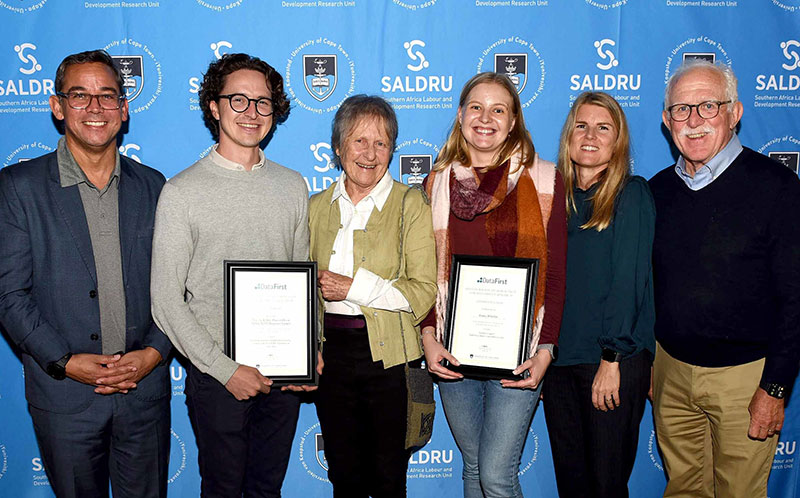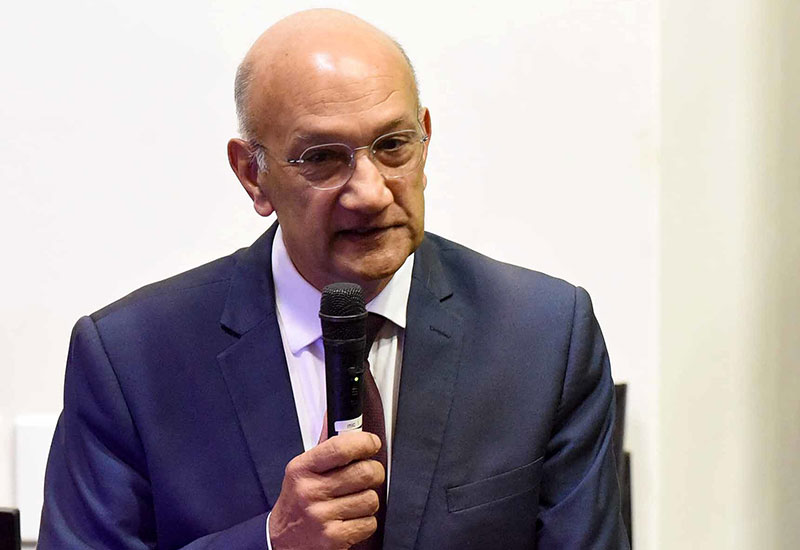Trevor Manuel delivers second annual Francis Wilson Memorial Lecture
19 April 2024 | Story Maya Skillen. Photos Nasief Manie. Videography Boikhutso Ntsoko, Ruairi Abrahams. Video Edit Boikhutso Ntsoko. VP Team Roxanne Harris, Ruairi Abrahams, Boikhutso Ntsoko, and Nomfundo Xolo. Read time 6 min.On Tuesday, 16 April, former finance minister Trevor Manuel presented the second annual Francis Wilson Memorial Lecture at the University of Cape Town (UCT). The event was hosted in association with the Southern Africa Labour and Development Research Unit (SALDRU) and research data service unit DataFirst, both based at UCT.
The annual lecture is held in honour of the late Professor Francis Wilson, who taught at UCT’s School of Economics for over 30 years. He was the founding director of SALDRU (in 1975) and DataFirst (in 2001), and one of the most pre-eminent economic researchers of his time.
“He dedicated his work to those who have had no economic power in our country,” said UCT Vice-Chancellor interim Emeritus Professor Daya Reddy in his introductory remarks. “The lecture provides a platform for experts to explore the ways in which economic science can promote social justice and equitable policy. We also hope that it will ignite in you the kind of passion that motivated Prof Wilson’s activist work in the field of economics.”

During the event, UCT postgraduates were awarded the Francis Wilson Memorial Prize for data-driven research in the area of development. Emeritus Professor David Lam, a member of the three-person panel of international adjudicators, presented the awards. Emma Whitelaw won the prize for the best chapter in a master’s or PhD dissertation completed in the past year, and Tim Köhler, Benjamin Stanwix, Robert Hill and Haroon Bhorat were awarded the prize for the best article published in a peer-reviewed journal, for their article “Lockdown stringency and employment formality: evidence from the COVID-19 pandemic in South Africa”.
Key address
Titled “How to build – and break – a capable state: structural reform and institution building in the democratic era”, Manuel’s lecture focused on South Africa’s economic approach to state building post-1994, and illuminated the consequent dismantling of that work.
Manuel, who served as South Africa’s Minister of Finance from 1996 to 2009, began the lecture with a nod to the late Professor Wilson and the first living standards measurement study of South Africa that the World Bank had commissioned SALDRU to undertake. The study established a baseline of living conditions at the start of the country’s democratic era.

“The first issue that Francis put on the table was access: the idea of saying to the World Bank that the data is the property of all South Africans and must be utilised by them for the purposes of research,” Manuel said.
Building a state
He went on to outline the circumstances under which South Africa’s democracy had to be built: high unemployment, negative economic growth, rampant poverty, high levels of inequality and a low domestic savings rate. Extensive borrowing from the World Bank was not an option, he pointed out, given the grave consequences of the bank’s economic structural adjustment programmes.
“The battle for sovereignty had to be retained in a policy sense,” he said. “It seemed the money that the Bretton Woods institutions appeared to offer undermined that very sovereignty.”
A different scaffolding was required to set about building the state: “Achieving macroeconomic stability, driving economic reforms, and a complete reorientation of public finances required close cooperation between macro-economic policy, micro-economic policy and budgeting,” Manuel explained.
By 1996, a major issue was still in play. Manuel recalled President Nelson Mandela asking him what was keeping him up at night, to which he admitted that what worried him most was the fact that debt service would be the country’s highest expenditure cost by 1998.
“President Mandela’s response was, ‘But then we’re spending more on the past than on the future,’” Manuel recalled. “We put that simple logic to good effect to ask a series of macro-economic questions, the first of which was: How do we reduce deficit?”
Many discussions, he added, were informed by the work of SALDRU.
“The outputs of the National Income Dynamics Study were engaged with on an ongoing basis for policy-making. [Wilson] cast a long shadow in the way in which policy decisions have been made by government.”
Tackling tax evasion, broadening the tax base and improving on revenue administrations were also important measures taken.
“Bit by bit, we were able to do that, and by 1997, when the South African Revenue Service Act went through and the new administration for revenue was built, for about 15 years, it did remarkably well.”
Delivering and dismantling
“We asked, how can we deliver on the first set of principles of our Constitution’s preamble that commits us to improving the living standards of each citizen and freeing the potential of each person?” Manuel recalled.
This set in motion a series of measures that included wrestling with the global shocks of the nineties, targeting inflation, introducing a medium-term framework to forecast expenditure over three years, training the media to communicate government policies with the public, bringing down the debt-GDP [gross domestic product] ratio, and passing the Public Finance Management Act.
“In the mid-2000s, we experienced almost no financial sector disruptions,” Manuel said. “Globally, we were recognised for budget transparency, and the World Bank recognised our budget as being the most pro-poor in the world.”
“If you build institutions, allow them to grow by allowing people to be, to grow, to share, to live out their values.”
However, he pointed out, the 2007 African National Congress (ANC) conference in Polokwane was a turning point, saying, “They threw us all out.” This development, along with the 2008 recession brought about by the collapse of financial giant Lehman Brothers, and the subsequent hiring and firing of South Africa’s finance ministers in the years that followed, contributed to the dismantling of the state.
“If you build institutions, allow them to grow by allowing people to be, to grow, to share, to live out their values,” Manuel said as he concluded the lecture.
To Professor Reza Daniels, the director of SALDRU, he said: “Work in the same way as Francis Wilson worked. Understand the value of data informing policy, and understand that we have the ability to rebuild – we’ve done it once; we can do it again.”
 This work is licensed under a Creative Commons Attribution-NoDerivatives 4.0 International License.
This work is licensed under a Creative Commons Attribution-NoDerivatives 4.0 International License.
Please view the republishing articles page for more information.















